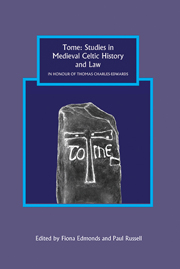Book contents
- Frontmatter
- Contents
- List of Illustrations
- Preface
- List of Contributors
- Abbreviations
- 1 Cloud-Cuckoo Land? Some Christian Symbols from Post-Roman Britain
- 2 Columbanus's Monasticism and the Sources of his Inspiration: From Basil to the Master?
- 3 Early Irish Priests within their Own Localities
- 4 Political Organisation in Dál Riata
- 5 Irish Boundary Ferta, their Physical Manifestation and Historical Context
- 6 Asser's Parochia of Exeter
- 7 Viking-Age Sculpture in North-West Wales: Wealth, Power, Patronage and the Christian Landscape
- 8 Iona v. Kells: Succession, Jurisdiction and Politics in the Columban Familia in the Later Tenth Century
- 9 A Twelfth-Century Indulgence Granted by an Irish Bishop at Bath Priory
- 10 Gerald of Wales, Gildas, and the Descriptio Kambriae
- 11 Patrick's Reasons for Leaving Britain
- 12 Learning Law in Medieval Ireland
- 13 Holding Court: Judicial Presidency in Brittany, Wales and Northern Iberia in the Early Middle Ages
- 14 The Iorwerth Triads
- 15 The Recovery of Stolen Property: Notes on Legal Procedure in Gaelic Ireland, Scotland and the Isle of Man
- 16 Contentious Kinship: The Penumbra of Established Kinship in Medieval Irish Law
- 17 Marriage by Purchase in Early Irish Law
- 18 Kingship Made Real? Power and the Public World in Longes Mac nUislenn
- 19 Mongán's Metamorphosis: Compert Mongáin ocus Serc Duibe Lacha do Mongán, a Later Mongán Tale
- Bibliography of the Writings of Thomas Charles-Edwards Maredudd ap Huw
- Index
- Tabula Gratulatoria
16 - Contentious Kinship: The Penumbra of Established Kinship in Medieval Irish Law
Published online by Cambridge University Press: 05 October 2013
- Frontmatter
- Contents
- List of Illustrations
- Preface
- List of Contributors
- Abbreviations
- 1 Cloud-Cuckoo Land? Some Christian Symbols from Post-Roman Britain
- 2 Columbanus's Monasticism and the Sources of his Inspiration: From Basil to the Master?
- 3 Early Irish Priests within their Own Localities
- 4 Political Organisation in Dál Riata
- 5 Irish Boundary Ferta, their Physical Manifestation and Historical Context
- 6 Asser's Parochia of Exeter
- 7 Viking-Age Sculpture in North-West Wales: Wealth, Power, Patronage and the Christian Landscape
- 8 Iona v. Kells: Succession, Jurisdiction and Politics in the Columban Familia in the Later Tenth Century
- 9 A Twelfth-Century Indulgence Granted by an Irish Bishop at Bath Priory
- 10 Gerald of Wales, Gildas, and the Descriptio Kambriae
- 11 Patrick's Reasons for Leaving Britain
- 12 Learning Law in Medieval Ireland
- 13 Holding Court: Judicial Presidency in Brittany, Wales and Northern Iberia in the Early Middle Ages
- 14 The Iorwerth Triads
- 15 The Recovery of Stolen Property: Notes on Legal Procedure in Gaelic Ireland, Scotland and the Isle of Man
- 16 Contentious Kinship: The Penumbra of Established Kinship in Medieval Irish Law
- 17 Marriage by Purchase in Early Irish Law
- 18 Kingship Made Real? Power and the Public World in Longes Mac nUislenn
- 19 Mongán's Metamorphosis: Compert Mongáin ocus Serc Duibe Lacha do Mongán, a Later Mongán Tale
- Bibliography of the Writings of Thomas Charles-Edwards Maredudd ap Huw
- Index
- Tabula Gratulatoria
Summary
The medieval Irish legal tradition placed a high value on the presence and social function of the child within the community, understanding the practice of child-rearing to be undertaken for the well-being (socamail) of the household. For social stability, a child ought to be the product of a union sanctioned by both affected kin-groups and preferably from parents within a common social bracket. And in all likelihood, this was the norm. A person's legal worth and status at birth could determine not only the manner of upbringing, but also ultimately a person's legal standing and the nature and extent of any involvement within the community. In a society like early Ireland, however, where a variety of sexual relationships were either permitted, acknowledged or refuted, legal concern centred on what impact various unions and separations might bring to bear on the kin-groups involved. Sexual relationships (whether by choice or circumstance) involving people of different social status, and with the possibility of procreation as an outcome, certainly piqued the interest of the medieval legal scholar. Ill-made contracts could be altered, rebalanced or rescinded; was a child a different matter? The modest aim of this contribution, therefore, is to venture into what Thomas Charles-Edwards has described as the ‘penumbra’ that surrounded established kinship in order to probe core legal impediments to kin-affiliation, while seeking to consider what path the medieval Irish legal commentators might advocate to resolve the fundamental issue of establishing a person's place within a kin and the community in turn.
- Type
- Chapter
- Information
- Tome: Studies in Medieval Celtic History and Law in Honour of Thomas Charles-Edwards , pp. 173 - 182Publisher: Boydell & BrewerPrint publication year: 2011



